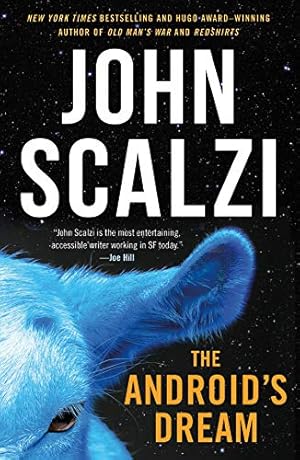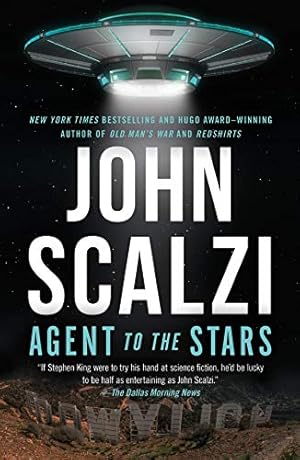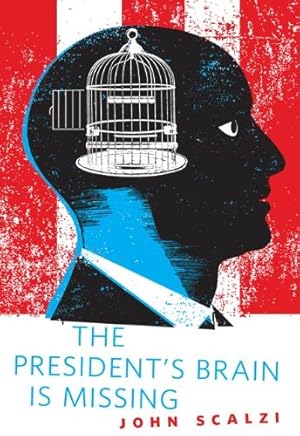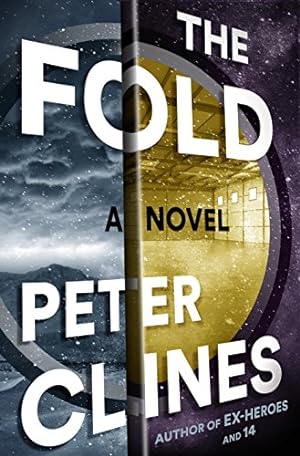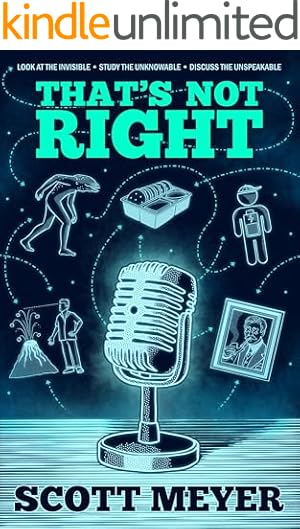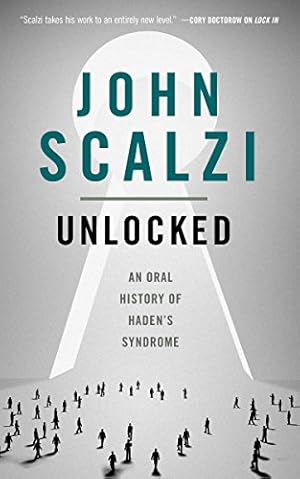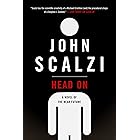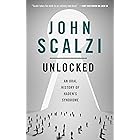Learn more
These promotions will be applied to this item:
Some promotions may be combined; others are not eligible to be combined with other offers. For details, please see the Terms & Conditions associated with these promotions.
Your Memberships & Subscriptions

Download the free Kindle app and start reading Kindle books instantly on your smartphone, tablet, or computer - no Kindle device required.
Read instantly on your browser with Kindle for Web.
Using your mobile phone camera - scan the code below and download the Kindle app.

Lock In: A Novel of the Near Future (Lock In Series Book 1) Kindle Edition
A blazingly inventive near-future thriller from the best-selling, Hugo Award-winning John Scalzi.
Not too long from today, a new, highly contagious virus makes its way across the globe. Most who get sick experience nothing worse than flu, fever and headaches. But for the unlucky one percent - and nearly five million souls in the United States alone - the disease causes "Lock In": Victims fully awake and aware, but unable to move or respond to stimulus. The disease affects young, old, rich, poor, people of every color and creed. The world changes to meet the challenge.
A quarter of a century later, in a world shaped by what's now known as "Haden's syndrome," rookie FBI agent Chris Shane is paired with veteran agent Leslie Vann. The two of them are assigned what appears to be a Haden-related murder at the Watergate Hotel, with a suspect who is an "integrator" - someone who can let the locked in borrow their bodies for a time. If the Integrator was carrying a Haden client, then naming the suspect for the murder becomes that much more complicated.
But "complicated" doesn't begin to describe it. As Shane and Vann began to unravel the threads of the murder, it becomes clear that the real mystery - and the real crime - is bigger than anyone could have imagined. The world of the locked in is changing, and with the change comes opportunities that the ambitious will seize at any cost. The investigation that began as a murder case takes Shane and Vann from the halls of corporate power to the virtual spaces of the locked in, and to the very heart of an emerging, surprising new human culture. It's nothing you could have expected.
Other Tor Books
Lock In: Lock In / Head On
Old Man's War: Old Man's War / The Ghost Brigades / The Last Colony / Zoe's Tale / The Human Division / The End of All Things
The Interdpendency: The Collapsing Empire / The Consuming Fire / The Last Emperox
The Android’s Dream
Agent to the Stars
Your Hate Mail Will Be Graded
Fuzzy Nation
Redshirts
At the Publisher's request, this title is being sold without Digital Rights Management Software (DRM) applied.
Shop this series
See full series- Kindle Price:$18.98By placing your order, you're purchasing a license to the content and you agree to the Kindle Store Terms of Use.
Shop this series
This option includes 2 books.
Customers also bought or read
- Redshirts: A Novel with Three Codas (Hugo Award Winner - Best Novel)Editors' pick
 Kindle Edition$11.99$11.99
Kindle Edition$11.99$11.99
Customers who bought this item also bought
 She was old and crankily conservative in the way only old liberals could be.Highlighted by 257 Kindle readers
She was old and crankily conservative in the way only old liberals could be.Highlighted by 257 Kindle readers “It’s not an effective protest if it’s not pissing people off.”Highlighted by 254 Kindle readers
“It’s not an effective protest if it’s not pissing people off.”Highlighted by 254 Kindle readers “We’re locked in, not unconscious. Trust me, Ms. Robinson. We notice where our bodies are. We notice it every moment we’re awake.”Highlighted by 189 Kindle readers
“We’re locked in, not unconscious. Trust me, Ms. Robinson. We notice where our bodies are. We notice it every moment we’re awake.”Highlighted by 189 Kindle readers
Editorial Reviews
Review
Praise for Lock In
"This is the kind of thriller that Michael Crichton, Lincoln Child, and James Rollins do so well. Add John Scalzi to that list." ―Douglas Preston, #1 NYT bestselling author of The Kraken Project and Impact
"As much as Scalzi has the scientific creativity of a Michael Crichton, he also has the procedural chops of a Stephen J. Canell to craft a whodunit with buddy-cop charm and suspects aplenty―most of them in someone else's body." ―USA Today
“Satisfying.” ―NPR
“Scalzi takes his work to an entirely new level.” ―Cory Doctorow
“A smart, thoughtful near-future thriller…. This powerful novel will intrigue and entertain both fans and newcomers.” ―Publishers Weekly, starred review
“John Scalzi may be the most entertaining writer in SF today.” ―Toronto Star
Praise for Head On
"Particularly relevant....A fun, breezy thriller, one that showcases a world that carries with it some extremely astute commentary on some of the real problems that we face in our own. " ―The Verge
"Head On doesn’t care if you’ve read Lock In or not, but it does care if you enjoy a mystery wrapped up inside a science fiction novel....This might even be one of the best introductions to Scalzi out there." ―Culturess
"[Scalzi's] prose flows like a river, smoothly carrying us through the story; his characters are beautifully crafted; and his future world is impeccably designed, at the same time wildly imaginative and wholly plausible." ―Booklist, starred review
"This taut mystery, filled with memorable characters in a well-constructed world, will keep readers on the edges of their seats." ―Publishers Weekly, starred review
"Readers will definitely showup for the witty banter and smartass takedowns….Very clever, wonderfully satisfying fun." ―Kirkus
About the Author
Product details
- ASIN : B00IHCBE1C
- Publisher : Tor Books (August 26, 2014)
- Publication date : August 26, 2014
- Language : English
- File size : 678 KB
- Text-to-Speech : Enabled
- Screen Reader : Supported
- Enhanced typesetting : Enabled
- X-Ray : Enabled
- Word Wise : Enabled
- Print length : 337 pages
- Best Sellers Rank: #71,310 in Kindle Store (See Top 100 in Kindle Store)
- #127 in Medical Thrillers (Kindle Store)
- #155 in Cyberpunk Science Fiction (Kindle Store)
- #241 in Psychic Mysteries
- Customer Reviews:
About the author

John Scalzi writes books, which, considering where you're reading this, makes perfect sense. He's best known for writing science fiction, including the New York Times bestseller "Redshirts," which won the Hugo Award for Best Novel. He also writes non-fiction, on subjects ranging from personal finance to astronomy to film, was the Creative Consultant for the Stargate: Universe television series. He enjoys pie, as should all right thinking people. You can get to his blog by typing the word "Whatever" into Google. No, seriously, try it.
Customer reviews
Customer Reviews, including Product Star Ratings help customers to learn more about the product and decide whether it is the right product for them.
To calculate the overall star rating and percentage breakdown by star, we don’t use a simple average. Instead, our system considers things like how recent a review is and if the reviewer bought the item on Amazon. It also analyzed reviews to verify trustworthiness.
Learn more how customers reviews work on AmazonCustomers say
Customers find the book's premise intriguing, with one noting how the sci-fi elements are seamlessly integrated into the story. Moreover, the book receives praise for its well-realized characters, fast-paced narrative, and trademark Scalzi humor throughout the dialogue. Additionally, customers appreciate its realistic portrayal of a well-thought-out universe.
AI-generated from the text of customer reviews
Select to learn more
Customers find the book's premise intriguing and suspenseful, with an excellent plot. One customer particularly appreciates the hard sci-fi worldbuilding.
"...Plus, it was funny! I’m impressed with how many big societal changes he worked into this story; technology, social policy and just social changes,..." Read more
"...In Scalzi’s most excellent clever style of writing and idea formation, this book knits together dozens of recent popular plot devices funneling them..." Read more
"An exceptionally well written and engaging tale. A true “page-turner”. Hopefully more in the series to follow? Yes please!..." Read more
"...The story and the writing are phenomenal, it’s just not the genre for me. A little slow in the beginning, but overall I really enjoyed this one" Read more
Customers find the book well thought out and a quick good read, with one customer describing it as a page-turning delight.
"...’s Syndrome which is narrated by a full cast of well-known and excellent narrators. Originally published at Fantasy Literature website." Read more
"...In Scalzi’s most excellent clever style of writing and idea formation, this book knits together dozens of recent popular plot devices funneling them..." Read more
"An exceptionally well written and engaging tale. A true “page-turner”. Hopefully more in the series to follow? Yes please!..." Read more
"...Last but not least, the back story is original, captivating and elegantly exposed...." Read more
Customers enjoy the characters in the book, finding them great and fun, with one customer noting their three-dimensional nature.
"...Unlocked: An Oral History of Haden’s Syndrome which is narrated by a full cast of well-known and excellent narrators...." Read more
"...premise feels like it could happen in a few years, the characters are engaging and have depth, and the writing (of course) is precise and fun...." Read more
"...It's a direct, linear plot marked by interesting characters and excellent dialog...." Read more
"...Scalzi does a workman like job in building character, particularly for Chris Shane, the FBI agent...." Read more
Customers enjoy the book's pacing, describing it as a quick and enjoyable read, with one customer noting its well-researched content.
"...many big societal changes he worked into this story; technology, social policy and just social changes, in a framework of a police procedural...." Read more
"...going, characters trade sharper, briefer conversation, which quickens the pace and reveals the power struggle happening beneath the surface...." Read more
"...You can read the novel quickly, but perhaps you might also pause once in awhile to reflect on some of the deeper layers...." Read more
"...But the fast and intriguing plot will keep you wondering what happens next." Read more
Customers enjoy the book's humor, particularly Scalzi's trademark wit and fun dialogue throughout the story.
"...-person narrative voice reads as youthful and sincere, funny without being overly snarky. Chris is a fully-realized character...." Read more
"...developments, the well-executed action sequences and the occasional humorous touches...." Read more
"...Recommended for anyone who likes science fiction with an undertone of social commentary and highly recommended for Scalzi fans." Read more
"...Somewhat innocent and seltered even for a victim of a devastating disease and not to mention heir to a fortune...." Read more
Customers find the book's universe well thought out and vividly drawn, with one customer noting its tremendous detail.
"...a run for the Senate from his home state of Virginia, is also nicely drawn...." Read more
"...Last but not least, the back story is original, captivating and elegantly exposed...." Read more
"...the best I had read in years- classic space cowboy sci fi with tremendous detail, humor and characters...." Read more
"...may be a little harsh/exaggerated, but at the end of the book it felt superficial - let's get the super-evil bad guy and then all live in a world of..." Read more
Customers find that the book works well, with one customer noting that it develops its themes expertly and operates on multiple levels.
"...and dismissed one by one, gradual revelation of clues - but it really works...." Read more
"At his best, Scalzi writes stories that work on multiple levels. Lock In is no exception and, indeed, is perhaps the greatest example of that trait...." Read more
"...And it has a pretty large cast, which works really well with the interview structure of the novelette." Read more
"...This was not the case here. Good story, completed efficiently" Read more
Top reviews from the United States
There was a problem filtering reviews. Please reload the page.
- Reviewed in the United States on September 8, 2014In Lock In, Haden’s syndrome has created millions of people who are conscious and alert, but have no voluntary control of their bodies; they are, effectively, “locked in” to themselves. Government funded technology has developed ways to assist these, who are called “Hadens,” to function; both in a non-physical information-world called the Agora, and by using sophisticated Personal Transports or android bodies called “threeps.” (You might be able to figure out where that name comes from if you remember a certain gold-colored android from a popular trilogy of movies a few decades ago.) Chris Shane is a Haden, one of the two most famous Hadens in America, and a freshly-minted FBI agent. On the second day on the job, Chris and acerbic partner Leslie Vann take jurisdiction of a baffling case that involves a dead mystery man and an Integrator, a human who can let Hadens “ride” in his brain. This controversial murder comes on the eve of a week-long Haden protest against newly passed legislation that ends funding for services to Hadens. The Integrator, who is covered with the dead man’s blood, is the brother of a powerful and vocal Haden separatist, the coordinator of the protest demonstrations.
Terry read Lock In at the same time I did, so we decided to discuss it together. Kat just finished the audio version, so she’ll make some comments about that.
Terry: The police procedural style murder mystery plays out against a backdrop of dramatic political, social and technological changes. As in other books by John Scalzi, these rapid changes have brought humanity to a crossroads. The changes are sufficiently complex, however, that Scalzi is frequently pushed into dumping information by the bucketload on his readers. Most of the time, this works. The initial dump, which purports to be an article on a high school cheating website, reads well, just as do the conversations between experts we would expect FBI agents to utilize, or with witnesses. Sometimes the information is shoehorned in, as in an initial discussion between Chris and a Navajo police officer. I mostly appreciated the information, even when it was a bit awkward. As a mystery reader, though, I was alert to some of the stranger turns in the conversation, thinking that the odder information would serve as clues.
Kat: Infodumps usually bother me, and there were plenty of them in Lock In, but I actually welcomed them here. That’s probably because neuroscience and psychology are my areas of interest, so the parts of the book that I was most fascinated by were the parts explained in the infodumps. What happened in the brain to make these people lock in? How did scientists and engineers solve the problem? And, most importantly to me, is that even possible? (No, and probably never will be.) How did society react to locked in people walking around in robotic, or other people’s, bodies? The mystery was of less interest to me, except that it served to highlight the problems that would occur in a society where some of its participants are not physically in the bodies they’re using.
Marion: The info-dumps that bothered me came more, I think, from the roommate character, just because I thought the whole arrival of the roommates was a bit too convenient. That was my main plot-quibble with the whole book. On the other hand, watching Chris go house hunting gave me an idea of what many Hadens would be facing under the new laws. I’m a mystery reader too, and to me, this was a “how-dun-it” rather than a “who-dun-it.” I liked how Scalzi played fair with the clues, something even veteran mystery writers don’t always do. And the “how was it done?” question in this book was fascinating.
Terry: I liked that too, and it’s difficult to do with a science fiction mystery. There’s always the temptation to pull out a new gizmo and claim it fixes everything. Scalzi consistently avoids that temptation. The twists and turns of this particular law enforcement investigation are well-detailed, with no instances of Chris missing an issue because Leslie failed to point it out.
Marion: I liked the characters, too. Terry, you’re a more thorough reader than I am, and you noticed something important about one crucial character that leaves room for a lot of speculation. My favorite character was Leslie Vann, Agent Shane’s partner. I must just like humorously bitter cop characters! Chris Shane’s first-person narrative voice reads as youthful and sincere, funny without being overly snarky. Chris is a fully-realized character.
Kat: I thought that a few of the characters, including Chris and Leslie, sounded a little too much like the Scalzi persona, as many of his characters tend to do. They have that bantering, fast-paced, smart-and-snarky style that I associate with Scalzi online. If I didn’t know who wrote this book, I’d have guessed Scalzi right off. I listened to Wil Wheaton’s narration which was spot-on perfect but which, I’m sure, contributed to this feeling and to the fact that I didn’t notice what Terry did, either. By the way, there is another version of Lock In which is read by Amber Benson.
Terry: I thought Chris’s father, a wealthy former basketball player who is considering a run for the Senate from his home state of Virginia, is also nicely drawn. Other characters are little more than ciphers — we learn next to nothing about Chris’s mother, for instance, and not too much about the villains except that they’re people with no ethics or morals and a lot of greed.
Marion: And Dad’s a real estate mogul, don’t forget that.
Kat: Chris’s father was one of my favorite characters, too. I like that Scalzi didn’t portray him as I expected him to. (Though I think Scalzi’s playing with our expectations is getting a little gimmicky.)
Marion: I thought there was a bit of a gimmick with Chris’s father, too, but then I also think that we have a first-person narrator who’s a Haden, and this could be another example of how differently the Hadens view the world (certain things just don’t matter to them). And if you want an even more extreme example of that, there’s Cassandra.
Terry: Cassandra Bell! Even though we see very little of her, she intrigued me the most. She contracted Haden’s Syndrome in the womb, and has never known life as most humans do; in fact she spends most of her time in the non-physical world called the Agora. One gets the impression that Bell believes Hadens should not be cured, but should be treated as their own subculture, similar to the controversy in the Deaf community in our own world.
Kat: It made me think of the Deaf community, too, Terry. And, in fact, Scalzi makes that analogy in the prequel, Unlocked. I loved the Agora. I wish I could visit it.
Marion: Overall, Scalzi did an awesome job of “scaling” his Hadens, so we see a range on a continuum; some who got the syndrome as adults and are more closely identified to their physical bodies, and those like Cassandra. I want to say that it feels like Scalzi is creating a “post-appearance” culture among the Haden, where status and role will depend upon your Agora avatar and the quality of your “threep.”
Terry: Of rather more interest than plot or character to all of us, though, was Scalzi’s implicit — and sometimes explicit — commentary on various social and political issues, the sorts of “what if?” questions that really drive science fiction. Is a faction of humanity going to choose a life where all of the familiar markers, clothing, age, skin and hair color, height or weight don’t matter? How big will the divide be between the Hadens and the old-style humans? People who make snap assumptions in this book will face some surprises, making this book a nice comment on political correctness. But tolerance for the “other” has its most biting effect when considering the rights of the disabled, which seems to be Scalzi’s principal point. I found it rather unbelievable that threeps are so readily accepted in society as fully human, despite Scalzi’s backstory in the novella Unlocked. Chris never seems to run into anyone who wants to treat a threep as a machine instead of accepting that it’s a person. Have we really come that far, in a world that contains large numbers who still don’t even think of women or blacks as people worthy of being treated with respect? It would be nice to think so. Perhaps Scalzi had a few doubts on this score himself, given his inclusion of an episode with a wheelchair.
Marion: I don’t agree that there is complete acceptance. Chris seems to run into people who are willing to work with threeps, but he is mostly in large bureaucracies and mostly law enforcement. One of the Metro cops makes an ignorant remark about “clanks” versus “threeps,” and a Haden is mugged by a trio of Haden-haters. I agree with you that most of the time it seems remarkably idealistic. Part of the problem, I think, is that Scalzi thoroughly and carefully insulated Chris from any direct negativity growing up, by liberal applications of money and fame. Maybe that’s a weakness in the book.
Kat: Yes, there are some Haden-haters in the story, so society hasn’t completely accepted them, but remember that it’s been 25 years since the disorder started and almost everyone has a friend or family member affected. Most people would be very pleased about technology that lets their loved ones participate in the world, even if it does cause some Uncanny Valley discomfort.
Marion: I loved the wheelchair scene! When Chris shifts consciousness into a threep in Los Angeles, it is broken, because it belonged to a criminal and got damaged in a shoot-out. The threep can’t walk, so the L.A. field agent offers Chris a wheelchair for the damaged threep. I thought it said a lot about the gaps in acceptance of Hadens, without being preachy. It was in the Los Angeles FBI Field Office, so that seemed totally realistic to me. Plus, it was funny! I’m impressed with how many big societal changes he worked into this story; technology, social policy and just social changes, in a framework of a police procedural. It’s a solid 4.5 book for me. I think I read the book too quickly on the first go-round to catch all the subtleties, but I’m hoping (and betting) that there will be more books and stories in this world.
Terry: I agree, except that the house-hunting plot quibble didn’t bother me. Someone just starting a new job is likely to be house hunting! I found the book enthralling throughout. I’d rate it a 5.
Marion: I have no trouble with a 5.
Kat: Lock In was probably the most thought-provoking AND entertaining book I’ve read this year. (I’ve read many thought-provoking books and many entertaining books, but most didn’t manage to be both.) As I mentioned, I listened to the audio version which was produced by Audible Studios. I chose Wil Wheaton’s narration, but readers may also choose to listen to Amber Benson’s narration. Both are excellent (I listened to a sample of Benson) because both Wheaton and Benson “get” Scalzi’s characters. As a bonus, the audio version includes the prequel novella Unlocked: An Oral History of Haden’s Syndrome which is narrated by a full cast of well-known and excellent narrators.
Originally published at Fantasy Literature website.
- Reviewed in the United States on October 31, 2014John Scalzi is the synthesis king of cultural memes. In Scalzi’s most excellent clever style of writing and idea formation, this book knits together dozens of recent popular plot devices funneling them into an interesting new alternative universe.
I must admit I’m a HUGE Star Wars fan, and I’ve always adored 3CP0. The idea that Scalzi pursues in ‘Lock In’ of using 3CP0-style robots, Threeps, to act as Personal Transports for Haden disease survivors is SO cool I can hardly stand it. It’s so cool, I’d almost volunteer to have the virus injected if it wasn't for the horrendous physical costs if infected. Unfortunately, at the ‘present’ time period introduced in the first chapter to the reader, only Haden survivors are given access to Threeps. Haden’s devastating effects on the body, if the patient doesn’t die, are so horrendous nobody sane would want to go through this disease.
The book includes a ficticious document fully describing the history and effects of Haden’s syndrome as follows in part: “Haden’s syndrome is the name given to a set of continuing physical and mental conditions and disabilities initially brought on by “”the Great Flu,”” the influenza-like global pandemic that resulted in the deaths of more than 400 million people worldwide, either through the initial flu-like symptoms, the secondary stage of meningitis-like cerebral and spinal inflammation, or through complications arising due to the third stage of the disease, which typically caused complete paralysis of the voluntary nervous system, resulting in “”lock in”” for its victims. // The physical origin of the Great Flu is unknown, but it was first diagnosed in London, England….more than 2.75 billion people worldwide were infected during the disease’s initial wave. // The disease's progression exhibited differently in each individual depending on several factors, including personal health, age, genetic makeup, and relative environmental hygiene. The first flu-like stage was the most prevalent and serious, causing more than 75 percent of the overall deaths associated with Haden’s. However, a similar percentage of the affected presented only the first stage of the syndrome. A second stage of the syndrome, which affected the rest, superficially resembled viral meningitis and additionally caused deep and persistent changes in the brain structure of some its victims. While affecting fewer people, the second stage of Haden’s featured a higher mortality rate per capita.// Most who survived the second stage of Haden’s suffered no long-term physical or mental disabilities, but a significant number—more than 1 percent of those initially infected by the Great Flu—suffered from lock in. An additional .25 percent experienced damage to their mental capabilities due to changes in their brain structure but no degradation of physical ability. An even smaller number-not more than 100,000 people worldwide-experienced no physical or mental declines despite significant changes in their brain structure. Some of those in this latter category would go on to become “”Integrators.””
I typed all of this out because it perfectly sets up what the author explores with the various characters as they figure out what the nefarious mystery is behind a number of murders and/or suicides.
Our hero, new FBI agent Chris Shane, as one of the first victims of Hadens when a child, and because his father is rich and a Senator of the U.S. Congress, is able to afford the best threep models. Threeps are not super powerful robots, but are made to mimic human strengths and qualities as much as possible. There are a few advantages built in of course, such as the ability to turn up or down any of the normal human senses that have been replicated. However, since the robotic carriers are of metal material, they don’t eat. While a Haden individual is mentally riding aboard the threep via computer systems, the actual person is resting in a bed somewhere else, frozen in position with feeding tubes and catheters, with a nurse standing by in attendance, but having had a neural net implanted and grown into the brain. With the net, the frozen and disabled body is able to transfer its mind into a threep. Apparently, to the transferred mind, it feels as if the person is in two places at once - the hospital bed and the robot.
Integrators also have a neural net planted and grown into their brains, but instead of projecting their minds elsewhere, they act as human robots for Hadens who have the money to hire their services. When a Haden transfers their mind into an Integrator, they are able to take over that living person’s body and live like a normal flesh body.
There are rules and regulations for all of this activity. The entire world’s way of life has been changed to accommodate politically and socially the new demands that Hadens, threeps and Integrators have brought. However, other than the technological advances, people are still people. Civil rights legislation mean that Hadens like Shane are able to be FBI agents. But since people are still people, as usual there is prejudice, murder and other crimes, jealousy and class and race hatreds.
Shane, with his new partner, the experienced and burnt-out Leslie Vann, ex-Integrator, together find themselves in the thick of a murder investigation, a murder which should not have been possible because of the technology involved. But by the end of the week, Shane has gone through 4 threeps, more murders and various confusions caused by the hidden intentions of several politicians and rich industrialists involved in the future management of, as well as public financial support of, Hadens.
Since this is both a mystery and a science fiction novel, I found myself enjoying the novel enormously. It hit every note required by both genres. I found it amusing and clever despite its derivative bones. While John Scalzi copied most every idea introduced into our culture that lately entertains us on movie screens and television, he took it farther several steps into a territory which almost had me envying being locked in.
Almost.
Those readers who love these two genres, as well as loving clever writing, will not be disappointed. I think this is book one of a series yet to come. I’ll be waiting for the next one.
In the meantime, if the sociological challenges which are hinted at in this novel were cute but a tad lacking in traumatic weirdness for you, gentle reader, mental discombobulations caused by mind/body transferences have been explored in other books as well with really different angles, depths and universes.
I recommend:
Kiln People by David Brin
Altered Carbon, Broken Angels and Woken Furies by Richard Morgan
Ancillary Justice by Ann Leckie
The Quantum Thief by Hannu Rajaniemi
The People of Sand and Slag by Paolo Bacigalupi
There is a prequel on-line:
http://www.tor.com/stories/2014/05/un...
- Reviewed in the United States on March 12, 2025An exceptionally well written and engaging tale. A true “page-turner”. Hopefully more in the series to follow? Yes please! One more wore required for Amazon :-)
- Reviewed in the United States on February 16, 2025This was a bit too cop drama-y for me, but the overall plot and premise were genius. The story and the writing are phenomenal, it’s just not the genre for me. A little slow in the beginning, but overall I really enjoyed this one
Top reviews from other countries
-
 leboutteReviewed in France on May 10, 2018
leboutteReviewed in France on May 10, 20185.0 out of 5 stars Amusant, captivant, souvent interpellant, un excellent moment.
C'est l'histoire d'un tétraplégique qui devient un flic et qui fait équipe avec une alcoolo. Évidemment c'est plus compliqué que ça. En fait on pourrait résumer ce livre : "comment le crime s'adapte aux changements de la société." C'est une jolie pièce car l'auteur parvient non seulement à faire un roman du type qui a " tué qui et pourquoi" mais aussi à brosser un portrait saisissant de la société qui l'entoure et des évolutions de cette société au vu de la maladie de Haden. Avec tout ça un petit côté à la "die hard" qui n'est pas pour déplaire.
 Madeline ElayneReviewed in Canada on April 20, 2018
Madeline ElayneReviewed in Canada on April 20, 20185.0 out of 5 stars Both relevant and entertaining
As I re-read this in anticipation of its sequel, I was struck by the fact that I enjoyed it just as much the second time through. The book tackles serious and important issues like identity, autonomy, and othering, in a thoughtful and thought-provoking way, while still providing a fun romp of a sci-fi-enhanced crime novel.
-
 Filipe FariaReviewed in Brazil on March 29, 2017
Filipe FariaReviewed in Brazil on March 29, 20175.0 out of 5 stars Muito bom
Gostei muito, a premissa é muito interessante e a execução é excelente. Segundo livro do autor que leio, e estou gostando cada vez mais.
 Cliente_AmazonReviewed in Italy on April 13, 2024
Cliente_AmazonReviewed in Italy on April 13, 20245.0 out of 5 stars Best scifi living writer
No doubt. Simply adored every single line. Eager to go ahead into the trilogy. Don’t miss it. And, 10 years before a pandemic causing a (if you think of it, not so different kind of) lock-in.
-
 Marc PieperReviewed in Germany on October 18, 2014
Marc PieperReviewed in Germany on October 18, 20145.0 out of 5 stars Eines der besten SciFi-Bücher dieses Jahres
Wie leben Menschen mit Behinderung in unserer Gesellschaft? Und was passiert, wenn es auf einmal einen signifikanten Anteil der Bevölkerung betrifft? Mit »Lock In« erzählt John Scalzi eine farbenreiche und sehr spannende Geschichte über mögliche Folgen.
Eingeleitet wird die Entwicklung durch einen globalen Virus, der viele Menschen (jedenfalls die Überlebenden) die Kontrolle über ihre Körper raubt. Sie sind fortan ans Bett gefesselt und müssen von Maschinen am Leben erhalten werden. Geistig sind sie jedoch völlig fit, nur eingesperrt in einer leblosen Hülle. Da so viele Menschen davon betroffen sind – darunter auch die Frau des amerikanischen Präsidenten ›Haden‹, nach der die Krankheit und fortan auch die Überlebenden benannt werden – ist die Gesellschaft und damit die Politik gezwungen zu handeln. Sie stampft eine gewaltige Forschungsinitiative aus dem Boden, die große Fortschritte bringt, unter anderem im Bereich der Schnittstellen zwischen Mensch und Maschine. Dadurch ist es möglich die Gedanken der Hadens in ein gemeinsames Internet hochzuladen, von wo aus sie die Steuerung von Robotern übernehmen können, um wieder am alltäglichen Leben teilzunehmen. Doch mit der »Normalisierung« ihrer Lebensumstände, regt sich auch der erste politische Widerstand gegen die weiterhin hohen Subventionen, die vielen Menschen nun ungerecht erscheinen. Eine entsprechend verabschiedete Gesetzesvorlage sorgt für Unmut bei den Hadens, die sich von den ›anderen‹ diskriminiert fühlen. Es ist also genau die richtige Zeit für den Haden Chris, seinen ersten Job, und dazu noch beim FBI anzutreten – womit die Geschichte beginnt.
Negatives: Das Buch lebt sicher nicht von seinen tiefen Charakteren, denn diese hat es schlichtweg nicht. Zwar stehen die Hauptpersonen alle mehr oder weniger in Konflikt mit der Welt, doch wird dieser in keinem der Fälle wirklich aufgelöst. Auch eine Entwicklung erfahren sie nicht, nicht einmal der Held. Man kann sich nun darum streiten, ob man das von einer Geschichte erwarten kann oder nicht, gerade weil es sich eben um Science Fiction handelt, die ihren Schwerpunkt eigentlich auf andere Dinge setzt. Meiner Meinung nach leidet das Buch darunter nicht, zumal der Autor diese ›anderen Dinge‹ wirklich hervorragend macht.
Ein zweiter Punkt ist, dass der Autor es vermeidet seinem Leser Indizien zu geben, die es ihm ermöglichen, ein bisschen mitzurätzeln. Dadurch werden die eigentlichen Abläufe des Verbrechens (zumindest für einen Leser ohne besondere Detektivfähigkeiten – wie diesem Rezensenten) erst am Ende wirklich klar, ohne dass man Vermutungen anstellen ›durfte‹. Der Spannung tut das allerdings keinen Abbruch, denn...
Positives: Die Geschichte ist kurzweilig und spannend, durch hervorragende Spannungskurven und vor allem durch eine Menge Witz, der in den meisten Konversationen eingesprenkelt ist. Dadurch macht das Buch wirklich Spaß, auch wenn man, wie gesagt, am Lösen des Rätsels nicht allzu viel teilhaben kann. Besonders interessante Möglichkeiten ergeben sich durch die prinzipielle Unsterblichkeit der Hadens (können ja einfach den Roboterkörper wechseln), sowie ihrer Fähigkeit, weite Strecken in kurzer Zeit zurückzulegen (dieser Roboterkörper kann ja ganz woanders stehen). Konflikte zwischen FBI und Polizei; Hadens und ›Dodgers‹; Navajo und Amerikaner, tragen ihr Weiteres dazu bei, dass die Geschichte niemals langweilig wird.
Der Glanzpunkt in dem Buch ist, meiner Meinung nach, die hervorragende ›Science Fiction‹, also die durchdachte Entwicklung anhand bestimmter technologischer Entwicklungen. Das vermischt der Autor mit ein paar interessanten gesellschaftlichen Betrachtungen. Wie leben Menschen mit Behinderung in unserer Gesellschaft? Was passiert, wenn es auf einmal einen signifikanten Teil der Bevölkerung trifft (z.B. durch einen globalen Virus)? Was sind mögliche Folgen für Politik und Wissenschaft (wenn man annimmt, das Forschung stark durch staatliche Investitionen getrieben ist – was sein kann oder auch nicht)? Wie könnte der Rest der Bevölkerung darauf reagieren? Und wie würden große Konzerne versuchen, davon zu profitieren? Diese Fragen und noch einige mehr beantwortet der Autor wirklich meisterhaft.
Daher ist »Lock In«, meiner Meinung nach, eines der besten SciFi-Bücher dieses Jahres und vermutlich das beste bisher von John Scalzi – was eine Menge sagt.
Viel Spaß beim Lesen!







